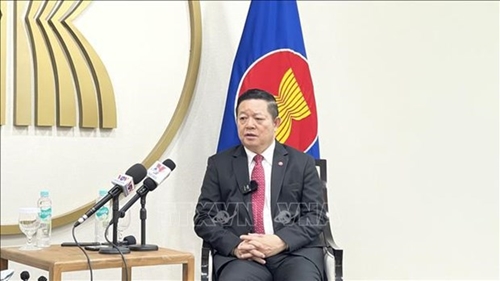He made the remarks during a recent interview granted to the Vietnam News Agency on the occasion of the 56th anniversary of ASEAN (August 8, 1967 - 2023).
He noted that since it became a member of ASEAN on July 28, 1995, Vietnam has played an active, pro-active, and responsible role, including in promoting the admission of new members so as to gather all the mainland and island Southeast Asian countries in the association.
    |
 |
|
ASEAN Secretary-General Kao Kim Hourn grants an interview to the Vietnam News Agency. |
Vietnam has not only made active contribution to ASEAN, especially in the building of the ASEAN Community in all the three pillars of politics - security, economy, and society - culture, but also helped bolster the bloc’s external relations. It has also taken part in all the mechanisms set up by ASEAN and established itself as an active and main participant in the drafting of the ASEAN Charter to ensure that this document is the lodestar for the development of the ASEAN Community, Kao said.
The Secretary-General said he is impressed with the country’s strong economic and trade development with its engagement in many bilateral and multilateral free trade agreements (FTAs).
Vietnam has created its own imprint on the regional organization and obtained many successes while holding the rotational Chairmanship of ASEAN in 1998, 2000, and 2020. It also has much experience in organizing ASEAN activities, acting as a country coordinator of the bloc’s relations with dialogue partners, and serving in many important roles in global organizations like the U.N. Security Council, he went on.
The ASEAN leader expressed his hope that Vietnam will remain an active and proactive member of ASEAN, suggesting it share its valuable experience with regional countries such as in terms of economic development, human resources quality improvement, community health protection, natural disaster management, diplomacy, and promotion of external partners’ engagement.
At the same time, the country can help with the development of ASEAN in all fields and pillars of the Community, as well as with the development of sub-regions, including the Mekong sub-region, he added.
Talking about ASEAN development, Kao said the association’s most outstanding achievement during its 56-year history is maintaining peace and security and expanding its membership to 10 at present and 11 in the coming time with the admission of Timor-Leste, thereby gathering the entire Southeast Asia in a community.
ASEAN, established during the peak period of the Cold War, is playing a very strong role in the region and the world, holding the centrality in the regional architecture, and also has the legal status thanks to the adoption of the ASEAN Charter in 2008.
With the 10 member states sending their ambassadors or permanent representatives to ASEAN along with the ambassadors of dialogue partners and other countries to the bloc, it could be said that ASEAN is growing strongly in terms of diplomatic relations, he noted.
As a community, the association has witnessed increasing people-to-people connectivity and exchanges while citizens of member countries now can travel freely in the region without the need for visas.
Additionally, the Secretary-General noted, ASEAN has become a single manufacturing hub and market on the basis of its Economic Community, which has been expanding and attracting attention of trading partners. It has signed many bilateral FTAs with partners like Japan, the Republic of Korea (RoK), China, Australia, New Zealand, and India; joined the Comprehensive and Progressive Agreement for Trans-Pacific Partnership (CPTPP) together with China, Japan, the RoK, Australia, and New Zealand; and is negotiating an FTA with Canada and discussing the possibility of an FTA with other trade areas like the European Union so as to generate more benefits for citizens.
To operate more efficiently, effectively and responsively and to maintain its unity, solidarity and centrality, ASEAN set up the High-Level Task Force on the ASEAN Community’s Post-2025 Vision towards 2045 so as to make recommendations and proposals to be submitted to regional leaders for approval in 2025, thereby developing ASEAN into a stronger bloc ready to cope with challenges, according to Kao.
Source: VNA